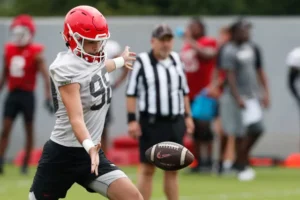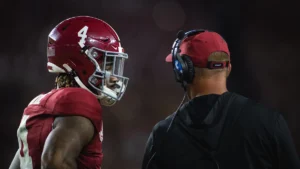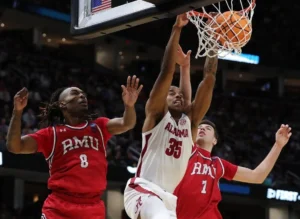
MiLaysia Fulwiley’s sudden decision to transfer to LSU has sent shockwaves through the world of college basketball. As a rising star with incredible potential, her decision not only reshapes the future of LSU’s program but also reverberates across the entire landscape of women’s basketball. For Dawn Staley, one of the most prominent coaches in the game today, the move represents more than just a strategic shift; it speaks to the complexities of player decisions, the competitive nature of collegiate sports, and the nuances of player-coach relationships.
In the wake of this seismic shift, Dawn Staley, head coach of South Carolina, finally broke her silence on the matter. In this article, we will explore Staley’s reaction, the implications of Fulwiley’s transfer, and the broader context surrounding the move.
The Shock and the Silence:
MiLaysia Fulwiley’s move to LSU came as a surprise to many fans and analysts who had followed her career. Fulwiley, a standout talent, had established herself as one of the key players in the country. Her decision to leave South Carolina, a team that had been built around her skills, was especially shocking. South Carolina, under Dawn Staley’s leadership, has become one of the most dominant forces in women’s basketball. However, Fulwiley’s departure left many questioning the underlying reasons.
For weeks, Dawn Staley had remained relatively quiet about the situation. Many speculated about her thoughts on the transfer, given her strong relationship with her players and her high expectations for them. Her silence was in stark contrast to the media frenzy that often surrounds such high-profile transfers.
However, as the shockwaves of Fulwiley’s decision continued to ripple through the basketball community, Staley eventually broke her silence. In an emotional statement, Staley explained her thoughts on the move, emphasizing the importance of personal growth and the need for players to make the decisions that best suit their futures.
Dawn Staley’s Perspective:
In her statement, Staley reflected on the nature of collegiate basketball and the ever-evolving landscape of player movement. While she expressed disappointment at losing a player of Fulwiley’s caliber, she also showed a deep understanding of the pressures that student-athletes face. Staley, known for her empathetic leadership style, emphasized the importance of supporting players in their decisions, even when those decisions lead them to different programs.
“I’ve always believed that the best interest of the players comes first,” Staley said. “MiLaysia’s decision is her own, and I respect that. It’s part of the process of growing and learning. While I would have loved to see her stay and continue her journey with us, I understand that she has her own path to walk.”
Staley’s words were a reminder of her approach to coaching: a blend of tough love and compassion. She has built a reputation for creating a family-like atmosphere within her teams, and her response to Fulwiley’s departure was a testament to that. Rather than lashing out or resorting to public criticism, Staley chose to focus on the positive impact that Fulwiley had on South Carolina’s program and acknowledged her potential for success at LSU.
The Competitive Landscape:
Fulwiley’s decision to join LSU is a direct challenge to South Carolina’s dominance in women’s college basketball. LSU, under coach Kim Mulkey, has quickly become one of the top programs in the nation. The addition of Fulwiley to an already star-studded roster gives LSU even more firepower and positions them as a formidable contender in the upcoming seasons.
This move also reflects the growing trend of players seeking out opportunities for personal and team success, often making transfers to programs that align more closely with their goals. For Staley, this reality is part of the ever-changing dynamics of the sport. In her statement, she acknowledged that the NCAA transfer portal has created a new era of player movement, where loyalty to one program is no longer a given.
“This is the nature of our sport now,” Staley said. “Players are making decisions based on their personal goals, and we have to adjust to that. It’s not just about the programs anymore; it’s about finding the right fit for the player.”
The Impact on South Carolina:
While Staley took the high road in her public comments, the loss of Fulwiley undoubtedly affects South Carolina’s future. The Gamecocks have been built around their defensive prowess and the leadership of players like Fulwiley, and her departure leaves a noticeable void. However, Staley is no stranger to overcoming adversity. With a track record of success and a wealth of talent already in her program, she will undoubtedly rally her team to move forward and continue their pursuit of excellence.
The Gamecocks still boast a talented roster, and with Staley at the helm, there is little doubt that South Carolina will remain a top-tier program. However, the impact of losing Fulwiley cannot be understated. As a player who had the potential to lead the team in scoring and defense, her departure presents a challenge that South Carolina will need to navigate in the coming seasons.
LSU’s Big Win:
For LSU, Fulwiley’s arrival is a game-changer. Coach Kim Mulkey’s program has been on an upward trajectory since her arrival, and adding Fulwiley to an already talented roster makes LSU an even more dangerous team. LSU’s success on the court has been fueled by a combination of experienced veterans and emerging stars, and Fulwiley’s addition to the mix gives the team even more depth.
Fulwiley’s style of play is a perfect fit for LSU’s up-tempo, high-pressure game. Her ability to score in a variety of ways, along with her defensive capabilities, will make her a key contributor from day one. With players like Angel Reese and Flau’jae Johnson already on the roster, LSU now has one of the most complete teams in the nation.
Mulkey’s leadership, combined with the talent of Fulwiley and her new teammates, positions LSU as a serious contender for national championships in the years to come.
The Bigger Picture:
While the immediate reactions to Fulwiley’s transfer have been focused on her individual decision and its impact on South Carolina and LSU, this move speaks to larger trends in college basketball. The rise of the transfer portal, the growing influence of NIL deals, and the evolving nature of player autonomy are all reshaping the sport.
Coaches like Dawn Staley are forced to adapt to these changes, balancing their desire to build long-term relationships with players while also respecting their agency in making decisions for their future. Staley’s comments reflect an understanding of this delicate balance, as she recognizes the importance of player empowerment while also striving to maintain the integrity of her program.
Dawn Staley’s decision to break her silence on MiLaysia Fulwiley’s transfer is a testament to her leadership and her commitment to her players. While the move may have been surprising, Staley’s response demonstrates a deep understanding of the complexities of college basketball and the personal journeys that players must navigate. As the landscape of women’s college basketball continues to evolve, the impact of moves like Fulwiley’s will be felt for years to come. Whether it’s South Carolina’s next steps or LSU’s rise to prominence, the future of the sport is bright, and coaches like Staley will continue to be at the forefront of it all.





